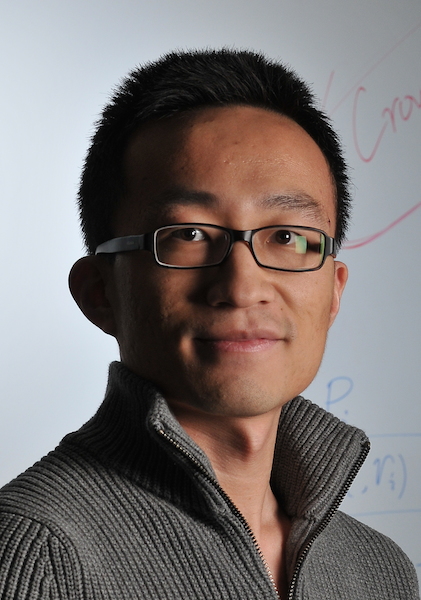| |
| |
CAREER: Toward Cooperative Interference Mitigation for Heterogeneous Multi-Hop MIMO Wireless Networks
Sponsored by the U.S. National Science Foundation (Award No. CNS-1564477)
Duration: 07/01/2014-6/30/2021
| 
|

|
|
|
Welcome to the website of our research project: "CAREER: Toward Cooperative Interference Mitigation for Heterogeneous Multi-Hop MIMO Wireless Networks". This website is created and maintained to disseminate and share research results and other information related to the project.
Project Synopsis
The ever-growing number of wireless systems and the scarcity for available spectrum necessitates highly efficient spectrum sharing among disparate wireless networks. Many of them are heterogeneous in hardware capabilities, wireless technologies, or protocol standards. The resulting cross-technology interference (CTI) can be detrimental to the performance of co-locating networks if not properly mitigated. Current interference management approaches mostly follow the interference-avoidance paradigm, where transmissions are separated in frequency, time, or space to enable spectrum sharing, rather than to reduce or eliminate interference. This project explores cooperative interference mitigation (CIM), a new coexistence paradigm among heterogeneous multi-hop wireless networks. By exploiting recent advances in multi-input multi-output (MIMO) interference cancellation (IC) techniques, the proposed approach allows disparate networks to cooperatively cancel/mitigate their CTI to enhance everyone?s performance. This research focuses on the following objectives: 1) Develop tractable models/frameworks to analyze the theoretical limits and performance bounds of CIM for heterogeneous multi-hop networks, considering various forms of network heterogeneity; 2) Study the incentives of CIM through a novel game theoretic framework, that characterizes the conditions of mutual cooperation and thwarts selfish or malicious behavior; 3) Design distributed performance-approaching algorithms to achieve CIM and integrate them into practical network/MAC layer protocols, by exploiting machine learning tools and implicit inter-system communications. The expected outcomes also include the development of various simulation toolkits and system prototypes for experimental validation.
The integrated education plan includes cross-discipline curriculum development, student mentoring and outreach. The proposed research will have broad impacts on unplanned heterogeneous multi-hop networks that share spectrum resources, such as current and future networks in unlicensed bands, and secondary networks in TV white spaces. Applications will benefit multiple domains including healthcare, energy, emergency services and military etc. Major results will be disseminated via conference and journal publications, software packages, talks and tutorials.
Personnel
Principal Investigator
 |
Dr. Ming Li
Associate Professor
Department of Electrical and Computer Engineering
The University of Arizona
Email: ming.li@arizona.edu
Homepage: http://wiser.arizona.edu/mingli/ |
Previous Graduate Students
 |
Yanjun Pan
Ph.D., Electrical and Computer Engineering (August 2016 - Aug. 2021)
Department of Electrical and Computer Engineering
University of Arizona
Email: yanjunpan@email.arizona.edu
Homepage: http://u.arizona.edu/~yanjunpan/
|
 |
Yantian Hou
Ph.D., Department of Computer Science
Utah State University (Visited University of Arizona from 2015 - 2016)
Current Employment:
Assistant Professor, Computer Science Department, Boise State University
Email: yantianhou@boisestate.edu
Homepage: http://cs.boisestate.edu/~yhou/
|
Current Graduate Students
 |
Zhiwu Guo
Ph.D. student (August 2017 - Present)
Department of Electrical and Computer Engineering
University of Arizona
Email: zhiwuguo@email.arizona.edu
Homepage: |
List of Collaborators
Related Publications
Thesis/Dissertations:
-
"Enhance Wireless Network Performance and Security with Reconfigurable Antennas"
Yanjun Pan,
University of Arizona, Ph.D. Dissertation, Aug. 2021.
Journal Papers:
-
"Enhancing LTE and WiFi Coexistence in Unlicensed Bands with Success Interference Cancellation"
Zhiwu Guo, Amir Hossein Yazdani Abyaneh, Ming Li and Marwan Krunz,
Under Submission, 2021.
-
Tianchi Zhao, Ming Li, and Yanjun Pan,
IEEE Transactions on Wireless Communications (TWC), accepted, 2021.
-
Islam Samy, Xiao Han, Loukas Lazos, Ming Li, Yong Xiao, and Marwan Krunz,
IEEE Transactions on Mobile Computing (TMC), accepted, Oct 2021.
-
"Secure Retrospective Interference Alignment"
Mohamed Seif, Ravi Tandon and Ming Li,
Journal of Entropy , accepted, Oct 2019.
-
Trading Privacy for Utility in Database-assisted Dynamic Spectrum Access
Ahmed Salama, Ming Li, Loukas Lazos, Yong Xiao, and Marwan Krunz,
IEEE Transactions on Cognitive Communications and Networking (TCCN), accepted, May 2019.
-
“Message Integrity Protection over Wireless Channel: Countering Signal Cancellation via Channel Randomization,”
Yanjun Pan, Yantian Hou, Ming Li, Ryan Gerdes, Kai Zeng, Md Asaduzzaman Towfiq, Bedri Cetiner,
IEEE Transactions on Dependable and Secure Computing (TDSC), accepted, pp. 1-14, Sept. 2017.
-
-
-
Conference Papers:
- "Regret Analysis of Stochastic Multi-armed Bandit Problem with Partial Information Feedback",
Tianchi Zhao, Bo Jiang, Ming Li and Ravi Tandon,
The 2020 International Joint Conference on Neural Networks (IJCNN 2020), Jul. 19-24, 2020, Glasgow, UK.
- "Privacy-Utility Tradeoff in Dynamic Spectrum Sharing with Non-Cooperative Incumbent Users",
Ahmed Salama, Ming Li, Loukas Lazos, Yong Xiao, and Marwan Krunz,
IEEE International Conference on Communications (IEEE ICC'20, CRAN Symposium), Dublin, Ireland, June 6-11, 2020.
- "ROBin: Known-Plaintext Attack Resistant Orthogonal Blinding via Channel Randomization",
Yanjun Pan, Yao Zheng and Ming Li,
(IEEE INFOCOM 2020), Apr. 2020, Beijing, China (Acceptance rate: 19.8%)
- "Enhancing LAA/WiFi Coexistence via Concurrent Transmissions and Interference Cancellation",
Zhiwu Guo, Ming Li and Yong Xiao,
The IEEE International Symposium on Dynamic Spectrum Access Networks (IEEE DySPAN 2019), Newark, NJ, November 11-14, 2019.
- "LTE Misbehavior Detection in Wi-Fi/LTE Coexistence Under the LAA-LTE Standard",
Islam Samy, Loukas Lazos, Yong Xiao, Ming Li and Marwan Krunz,
11th ACM Conference on Security and Privacy in Wireless and Mobile Networks (ACM WiSec 2018), Stockholm, Sweden, Jun. 18-20, 2018
- “On the Secure Degrees of Freedom of the K-user Interference Channel with Delayed CSIT”,
Mohamed Seif, Ravi Tandon and Ming Li,
2018 IEEE International Symposium on Information Theory (IEEE ISIT), Vail, CO, Jun. 2018.
- On the Throughput Limit of Multi-Hop Wireless Networks with Reconfigurable Antennas,
Yanjun Pan, Ming Li, Neng Fan, and Yantian Hou,
the 15th Annual IEEE International Conference on Sensing, Communication, and Networking (IEEE SECON 2018), Jun. 2018, Hong Kong, China (Acceptance rate: 23.2%)
-
-
-
-
-
-
Cooperative Cross-Technology Interference Mitigation for Heterogeneous Multi-hop Networks
Yantian Hou, Ming Li, Xu Yuan, Y. Thomas Hou, and Wenjing Lou,
The 33nd IEEE International Conference on Computer Communication ( INFOCOM), Toronto, ON, Canada, Apr. 27 – May 2, 2014 (Acceptance ratio: 320/1645=19.4%).
Disclaimer: The papers here are made available for timely dissemination of scholarly and technical work. Copyright and all rights therein are retained by authors or by other copyright holders.
Educational Activities (Curriculum Development)
At the University of Arizona:
- ECE 696B: Advanced Topics of Information and Network Security (covers wireless security topics as part of final project)
- The PI developed and taught a new course “advanced topics of information and network security” (ECE 696B) in the ECE department in Fall 2020, which is a graduate level, seminar-type course focusing on advanced cryptographic concepts and research literature in wireless and mobile security (8 graduate students were enrolled and two audited). Several course projects on wireless security were assigned and completed by different teams. This year, two student teams (four students in total) chose to do research projects in wireless-security related topics: “Heterogeneous IoT Device Paring through Wireless Signals”, and “Stealthy Jamming Attack on Wi-Fi 6 Networks”. The above projects enhance students’ understanding about wireless security research as well as highlights the importance of security in wireless networks.
- ECE 471/571: Fundamentals of Information and Network Security (covers wireless security topics as part of final project)
- In each year, the PI included a final course project in this class, in which the students need to choose between two options, either implementation or a research survey. For the latter option, several topics related to wireless network security are included. In the Spring 2020 semester, the total enrollment was 60 and undergrad/graduates were about 62% /38%. Four student teams chose to work on the following topics: “Overview of Physical Layer Authentication Techniques”, “A Survey of Physical-Layer Security: Classical to Contemporary”, “Jamming Techniques in Wireless Networks”, and “A Review of Authentication Protocols of RFID Systems”. This project enhances their understanding about wireless security research as well as highlights the importance of security in wireless networks.
- ECE 478/578: Fundamentals of Computer Networks (covers wireless MAC protocols, and MIMO interference cancellation)
- In Fall 2018, the total enrollment was 83 and undergrad/graduates were about half and half. In the midterm project, the students were asked to team-up and develop their own discrete-time simulator to study the performance of two basic MAC protocols (CSMA/CA with collision avoidance and CSMA/CA with virtual carrier sensing), and under two scenarios (concurrent transmissions and hidden terminal cases). This project enhances their understanding about MAC protocols in wireless networks, as well as highlights the importance of mitigating interference between different networks.
At Utah State University:
- CS 6460: Computer Security II (covers the topic of wireless security, especially jamming and anti-jamming using MIMO)
Outreach and other broader impact outcomes:
The ECE department made a two-minute highlight video for the PI and his research lab in July 2019, and posted it publicly on the ECE department’s website since Fall 2019 (for student recruiting and dissemination purposes). The video includes a demo of our experimental platform for CSI measurement. The link is as follows:
Also, the PI and two of his PhD students gave three tech talks to about 20 summer REU students in the ECE department on 7/10/2019 (lasted two hours in total). Those REU students were mostly senior undergraduates, and many of them came from other universities in the US, who were working on different projects in other labs in our department. The attendees also include several graduate students in the department. The talks focused on three different topics: enhancing wireless physical layer security via active channel randomization, privacy-preserving data analytics, and adversarial examples in machine learning. At first, the PI gave an overview of all the research topics in our lab, including improving coexistence between heterogeneous wireless networks using MIMO and interference cancellation (this project). In the talk presented by one PhD student, our method of using reconfigurable antennas to prevent signal cancellation attacks and eavesdropping is introduced.
In the summer of 2021, PI Li co-hosted 5 apprenticeship students for the Army Educational Outreach Program (AEOP)’s Undergraduate Research Apprentice Program/High School Apprentice Program (2 undergrads and 3 high school students), supervising them on hands-on research projects on secure vehicular platooning and heterogeneous wireless device pairing in IoT. A Ph.D. student who worked under this project previously acted as a mentor to those students. The students learnt basic approaches and process of doing research, how to read literature and formulate new problems, come up with new solutions, and how to use hardware/software tools like USRP, Matlab, latex, and Labview, basics of wireless communications, network and information security, and machine learning concepts. They also conducted USRP- and WiFi- based experiments (involving two of the high school students) to gather and analyze channel state information (CSI) data for the heterogeneous device pairing project. Link to news story
Note: Any opinions, findings and conclusions or recommendations expressed on this website are those of the author(s) and do not necessarily reflect the views of the National Science Foundation (NSF).
|
| |
|
|












